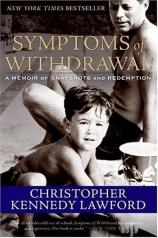Symptoms of Withdrawal: A Memoir of Snapshots and Redemption
Review
Symptoms of Withdrawal: A Memoir of Snapshots and Redemption
You can't really understand the Kennedy family without a cheat
sheet. There are simply too many of them. Christopher Kennedy
Lawford distinguished himself by becoming a soap opera star,
appearing on "All My Children" through the 1990s, a happy time for
him because he was working steady and staying sober. He has proven
himself to be a competent, if somewhat wordy, writer in this
fast-moving memoir.
Alcoholism is clearly the curse of the Kennedy clan, and Lawford
came by it honestly, from his mother Pat Kennedy, who was unwilling
or unable to acknowledge her own ghosts, and his father Peter
Lawford, a handsome, hard-working actor, a hard-living Hollywood
animal and "womanizing spendthrift" (as his ex-wife later
characterized him). Peter had a suave English accent and "bedroom
eyes" that he passed on to his son, and he used his charms to bed
most of the beauties in his circle. It was a circle that included
the hottest babes of the day. Peter was a charter member of the
infamous Rat Pack and a regular at Hugh Hefner's mansion. At one
point in his adolescence, Lawford recalls, "My dad was entertaining
some mates from England --- John Lennon, Ringo Starr and Mick
Jagger. Yeah, this will work."
So Lawford grew up surrounded by the brightest stars that Hollywood
was spitting out in the latter half of the 20th century, as well as
the kings and king-makers whose power ebbed and flowed through
Washington. He was closer than a kid ought to be to the Cuban
Missile crisis and the Civil Rights movement. And he was in the
bosom of a family torn apart twice by bullets and violent,
senseless death. As he puts it, "Having a family member killed
definitely messes with your sense of safety. What I realize now
about my uncles' assassinations is that the massive outpouring of
collective grief and goodwill toward the family obscured the
underlying realization that there were people in the world who
wanted to blow our f---ing heads off." Very likely, too, the public
process prevented private grieving, compelling the Kennedys to act
more courageous than they felt, and less emotional.
Lawford and many of his cousins reacted by wilding. When you have
access to wealth and plenty of pull, the fences are few. The drugs
that they indulged in were common for the niche of society they ran
with, and testing the limits in the underbelly of commerce, dealing
with the dealers, just made the game more exciting. Busts and bail,
repeated exercises in forgiveness and failure, were par for the
course. When his beloved cousin David died of an overdose, a
distant alarm bell went off in Lawford's fogged consciousness. But
it took years to pull himself back from the brink.
You can't feel too sorry for a kid who had every chance, every
privilege, and who continually blew it, and it's fair to say that
Lawford asks for no sympathy. He recounts his own fall into
disgrace and ruin with gallows humor. He rejoices in his one great
success: becoming sober --- something his father never achieved.
However, the book is ridden with self-congratulation thinly
disguised as self-criticism. When Lawford left his wife he called
himself all sorts of names, but had to add this small bit of
back-talk: "even if a woman gets everything she wants in a
marriage, if a man leaves, past history is rewritten and suddenly
it is she who sacrificed her life so he could live his
dream."
SYMPTOMS OF WITHDRAWAL unmasks the Kennedy legend only to a limited
extent. The author (or the publisher?) takes advantage by, for
example, using a cover shot of Lawford as a kid with his famous
Uncle Jack rather than with either less-recognizable parent, even
as the book claims to mock the iconography of Kennedy Clanship.
Lawford is perhaps overly kind to Uncle Ted, whom he calls Le
Grande Fromage, and one suspects some patronage issues there.
The Kennedy whom Lost Boy Christopher most admired, it seems, was
his Uncle Bobby, arguably the best candidate for President of his
generation. He also speaks highly of Aunt Eunice, allowing us to
recall that there were, hidden off-stage, a number of Kennedys
whose lives took a different course, who reached out to others
(especially the mentally and physically handicapped), acted with
discretion, stayed reasonably sober, and sought no limelight.
Many will find this book --- grand in its scope as Lawford marches
all over the map of his culture and the events current --- a
satisfying read. Others will be left with questions, though these
questions are perhaps inappropriate to the medium. All the guy is
trying to do, for heaven's sake, is write about himself, and in
that he succeeds.
Reviewed by Barbara Bamberger Scott on January 23, 2011
Symptoms of Withdrawal: A Memoir of Snapshots and Redemption
- Publication Date: October 10, 2006
- Genres: Nonfiction
- Paperback: 448 pages
- Publisher: Harper Paperbacks
- ISBN-10: 0061131237
- ISBN-13: 9780061131233




